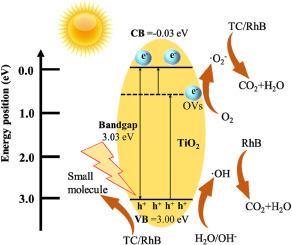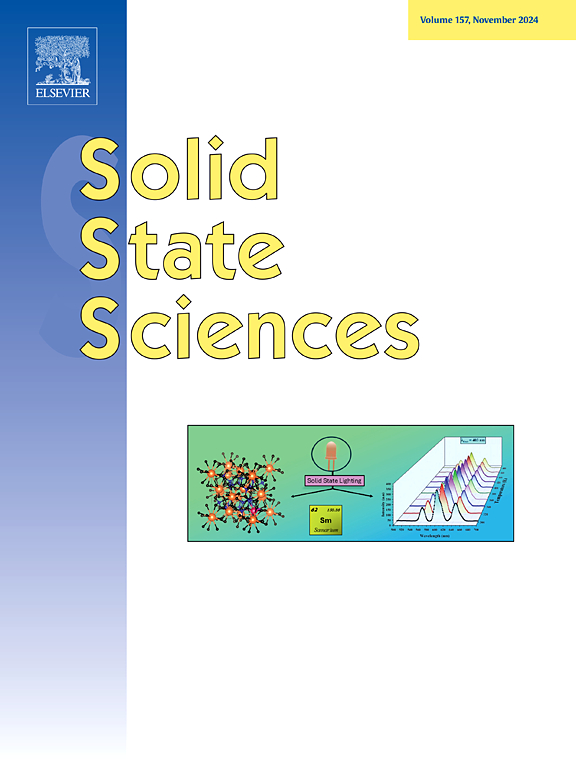Enhanced photocatalytic performance of TiO2 with tunable oxygen vacancies induced by H2/N2 mixture treatment
IF 3.4
3区 化学
Q2 CHEMISTRY, INORGANIC & NUCLEAR
引用次数: 0
Abstract
Surface treatment can effectively modulate the surface properties of a photocatalyst to hasten the separation and transfer of photoinduced charges, ultimately achieving high photocatalytic performance. Herein, surface treatment of anatase-phase TiO2 prepared by a hydrothermal method was performed under H2/N2 mixed atmosphere. The experimental results demonstrate that roasting TiO2 in a H2/N2 atmosphere can effectively reduce partial Ti4+ to Ti3+, thereby facilitating the production of tunable oxygen vacancies (OVs) by disrupting Ti-O-Ti bonds. OVs can construct defective energy levels to bring about a decrease in the bandgap of TiO2 and an extension of light absorption range. Moreover, OVs remarkedly improve the separation of photoinduced charges of TiO2 and accelerate the photocatalytic reaction as active sites. The photocatalytic experimental results demonstrate that TiO2 exhibits the highest performance when roasting TiO2 in a H2/N2 atmosphere for 2 h, and the photocatalytic degradation rate constant of rhodamine B (RhB) and tetracycline (TC) on this sample under simulated solar light irradiation is 2.24 and 1.11 times higher than that on the reference TiO2, respectively. These findings provide valuable insights for designing highly efficient photocatalysts for effective water pollution treatment.

H2/N2 混合气处理诱导具有可调氧空位的 TiO2 光催化性能增强
表面处理可有效调节光催化剂的表面性质,加速光诱导电荷的分离和转移,最终实现高光催化性能。本文在 H2/N2 混合气氛下对水热法制备的锐钛矿相 TiO2 进行了表面处理。实验结果表明,在 H2/N2 混合气中焙烧二氧化钛能有效地将部分 Ti4+ 还原成 Ti3+,从而通过破坏 TiO-Ti 键促进可调氧空位(OV)的产生。OVs 可以构建缺陷能级,从而降低二氧化钛的带隙,扩大光吸收范围。此外,OVs 还能显著改善 TiO2 的光诱导电荷分离,并作为活性位点加速光催化反应。光催化实验结果表明,在 H2/N2 气氛中焙烧 TiO2 2 小时后,TiO2 表现出最高的性能,在模拟太阳光照射下,该样品对罗丹明 B(RhB)和四环素(TC)的光催化降解率常数分别是参考 TiO2 的 2.24 倍和 1.11 倍。这些发现为设计有效处理水污染的高效光催化剂提供了宝贵的启示。
本文章由计算机程序翻译,如有差异,请以英文原文为准。
求助全文
约1分钟内获得全文
求助全文
来源期刊

Solid State Sciences
化学-无机化学与核化学
CiteScore
6.60
自引率
2.90%
发文量
214
审稿时长
27 days
期刊介绍:
Solid State Sciences is the journal for researchers from the broad solid state chemistry and physics community. It publishes key articles on all aspects of solid state synthesis, structure-property relationships, theory and functionalities, in relation with experiments.
Key topics for stand-alone papers and special issues:
-Novel ways of synthesis, inorganic functional materials, including porous and glassy materials, hybrid organic-inorganic compounds and nanomaterials
-Physical properties, emphasizing but not limited to the electrical, magnetical and optical features
-Materials related to information technology and energy and environmental sciences.
The journal publishes feature articles from experts in the field upon invitation.
Solid State Sciences - your gateway to energy-related materials.
 求助内容:
求助内容: 应助结果提醒方式:
应助结果提醒方式:


